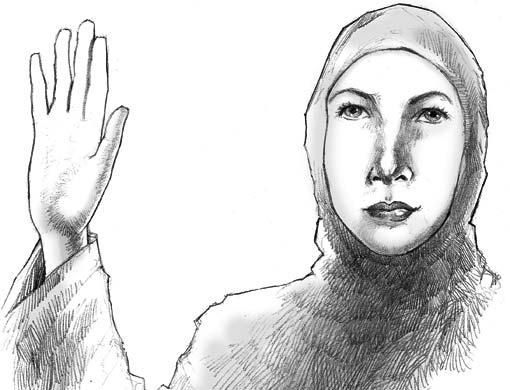In February this year, for the first time in the UAE's history, nine Emirati women were sworn in as members of the UAE Federal National Council.
This figure represents 22.5 per cent of the seats in parliament and accorded the UAE the distinct honour of being one of the few countries in the world with the highest percentage of female parliamentarians.
In a region where, in accordance with the local norms and traditions, most of the parliaments are usually dominated by males, our country changed the political landscape, specifically, the dynamics of female participation in the political arena of the Gulf countries.
The United Nations Development Programme (UNDP) ranks the Arab world as the second lowest region in terms of gender empowerment, and the Inter-Parliamentary Union ranks it as the lowest in terms of the percentage of women in parliament.
Hence, the recent appointment and election of women to the UAE parliament is an indication of the enlightened direction that our leadership is following in empowering women in our region. However, it is not a new phenomenon in the UAE.
Our founding father, Shaikh Zayed Bin Sultan Al Nahyan, was a pioneer of women's rights. He had often said that women were equal partners with their male compatriots in all walks of life and should have full rights to participate in the political process and decision-making.
Her Highness Shaikha Fatima Bint Mubarak, wife of our late president Shaikh Zayed, and Chairperson of the UAE General Women's Union, is carrying on the legacy of her husband by supporting women's rights, which has crystallised in the position UAE women hold today in parliament.
You may be asking yourselves why should this matter to you? Why should women want to be involved in public life, or in parliament?
The answer is very simple. We, the UAE women, comprise half of our society and it is illogical for us not to play an active role in parliament. It is in this arena that legislation and policies are debated and passed; legislation and policies that impact the daily lives of both men and women in our society.
As such it is the right and duty of UAE national women to be actively and effectively involved in this decision making process.
Although within a short time we have made a great leap forward, I believe that our journey has just begun.
His Highness Shaikh Mohammad Bin Rashid Al Maktoum, Prime Minister and the Vice-President of the UAE, and Ruler of Dubai, recently mentioned that what you see today in terms of achievements in our country represents only 7 per cent of the vision that our leadership has for our country.
So despite the fact that we in the UAE have one of the world's highest percentages of women in parliament, the Arab world as a whole still ranks the second lowest region in terms of the UNDP gender empowerment measure.
Experience
In this regard, I'd like to share my experience while I was attending a conference in Europe. Soon after my appointment, I attended a conference in Europe, where I had the opportunity to interact with some members of the Kuwaiti parliament.
I distinctly remember the clear look of disapproval on the face of one of the Kuwaiti MPs, after he met me. Here I was an Arab and Muslim woman appointed to the parliament and he obviously didn't believe that women should have any role in parliament, let alone politics in general.
This Kuwaiti MP's ideology is a reflection of the dynamics prevalent today in the Kuwaiti parliament in terms of the majority of the Kuwaiti MPs' opposition or disapproval of the participation of women in parliament.
I just smiled at his reaction because I believe that when you lead by example you don't need to argue, you just work hard to enlighten such people that women, after all, are also human beings and we are capable of achieving the impossible if we are given proper education, opportunity and support.
I also understand that I represented something to this Kuwaiti MP, something he didn't understand. I represented, along with my sisters in parliament, a generation of Arab and Muslim women who are determined to contribute to building our societies.
A generation of Arab and Muslim women who believe it is our right and our responsibility to serve our country as wives, as mothers, as teachers, businesswomen, entrepreneurs, ministers and as members of parliament.
It took centuries for women in the West to gain the right to vote, let alone the right to political office, while we are blessed in the UAE because we have existed as nation for only 35 years.
Yet here we are today, with one of the highest percentages in the world of female participation in parliament.
This is primarily due to our government's support, specifically the support extended to us by President His Highness Shaikh Khalifa Bin Zayed Al Nahyan and Shaikh Mohammad Bin Rashid, who I consider to be pioneers in their unwavering belief in the empowerment of women in the UAE.
Responsibilities
In other countries, women have had to fight for their political rights, while women in the UAE have been granted these rights, so let us never take our rights for granted. We shall remember every right entails responsibilities and we will work hard to live up to the expectations of our leaders and our society.
I say without any doubt that in the first 35 years of our existence as a nation, women in the UAE have made it to the hallowed precints of the parliament.
I believe in the next 10 years we will continue to build and develop the role and the rights of women in our society even further. And yes, we will continue to make history.
Najla Faisal Al Awadhi is a member of the UAE Federal National Council, Deputy CEO of Dubai Media Incorporated and General Manager of Dubai One TV.











